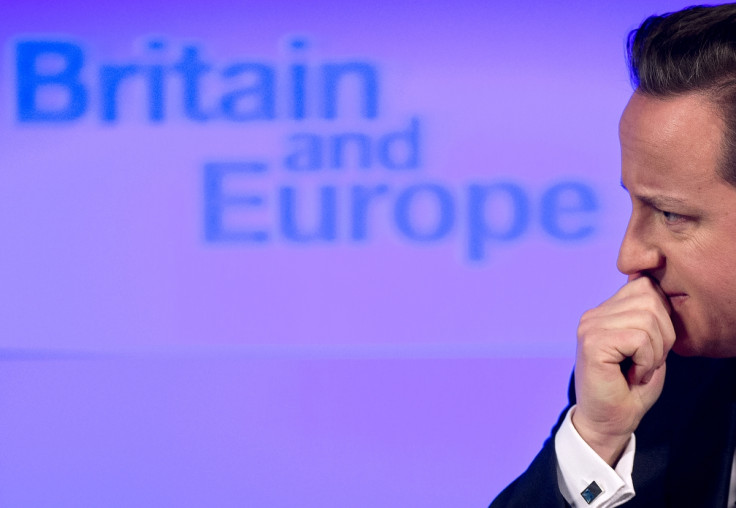David Cameron heckled: Small businesses want out and four more EU referendum claims

"It was the most terrifying thing I've done in my life, but definitely very worthwhile and I'm glad I did it," Peter Lyon, the student who heckled PM David Cameron at his pro-European Union speech at the Confederation of British Industry conference said. He was giving interviews to the press outside the conference with partner in crime, Phil Sheppard.
Shouting "CBI, voice of Brussels", the 19-year-olds made a clear point. They think the CBI misrepresents businesses and claim the organisation does not give a voice to smaller companies, allegedly keen on getting out of the EU.
Anti-EU campaign group Vote Leave even set up a fake company for Lyon and Sheppard, to allow them to enter the CBI. If two boys and a lobbying organisations are willing to go through such lengths to get a point across, it is clear they are passionate about their case.
But what is their case based on? Are their claims about the EU true? IBTimes UK looks at the most prominent economic arguments Brexit supporters give in the debate and considers whether they are true.
Small businesses want out
After the protest in Grosvenor House on 9 November, Sheppard explained his actions in a blogpost for the Huffington Post. His article read: "The CBI has been misrepresenting businesses on the EU for a number of years. It is only interested in speaking up for big businesses which have powerful lobbying arms in Brussels. It forgets about small businesses which are affected by onerous rules and regulations, but don't have the time nor money to have their say."
With companies the size of Tesco as members, it might seem like the CBI is only representing bigger firms. However with almost 200,000 membership companies, it is hard to argue the organisation is only representing those businesses.
The Federation for Small Businesses also surveyed its members and it found 47% of small businesses would prefer to remain in the EU, while 40% want to leave. Of those that would prefer to stay, almost 35% want to see more power in the UK while keeping the benefits of the Union. More than a quarter think the EU is perfect the way it is.
And as more and more small and medium-sized enterprises (SMEs) are exporting to other countries, the benefits for smaller businesses are more prominent as well.
The UK can make it on its own
According to the International Monetary Fund, the UK is the second largest economy in the EU, right after Germany. It is clear that Angela Merkel's country would gain a lot more from EU membership, but so does the UK: 72% of foreign investors say its position in the European single market makes it more appealing to invest in Britain, EY's attractiveness survey suggests. The UK, and London especially, is a magnet for foreign investment and the EU membership has helped make it more appealing.
The EU only has a couple of single free trade agreements
"If we leave the EU, we can sign more free trade deals with other countries," Sheppard told Sky News on 9 November. "The EU at the moment only has a free trade deal with South Korea and some other countries that are not the main economies."
John Cridland, outgoing director general of the CBI, pointed out the EU actually has 50 different trade deals. Although some of them are not branded as "free trade deals", they offer EU countries better tariffs when trading with many big economies.
Sheppard was especially upset about the lack of UK-China free trade deals, despite the fact that Chinese President Xi Jinping signed £30bn worth of deals during his trip to the UK. The EU is also in talks with China to agree on a trade deal. Although the negotiations for an investment agreement were launched in 2013, the EU wants China to conform with World Trade Organization obligations.
A controversial trade deal called TTIP (Transatlantic Trade and Investment Partnership) is a Euro-US trade agreement that has been discussed for years and has gathered many opponents. However, if the UK leaves the EU, a comparable trade agreement could be possible.
Economic legislation in the UK comes predominantly from the EU
'CBI - voice of Brussels' say protestors who stand up in middle of audience interrupting PM speech pic.twitter.com/2z14QuqIxz
— Chris Ship (@chrisshipitv) November 9, 2015"We can restore the independence of the British parliament which means that EU laws can pass more democratically," Lyon said in the interview. Brexit lobbyists claim the majority of economic legislation in the UK comes from the EU and they have a point.
Former European Commission president Jacques Delors claimed at one point that 80% of laws eventually adopted by EU member states actually originate from Brussels, but the reality is a lot less exaggerated. Although more than 50% of significant UK legislation with a significant economic impact "originates from" EU legislation, only 6.8% of primary legislation and 14.1% of secondary legislation comes from the EU.
Britain has Commonwealth and other partners, it doesn't need the EU
When discussing the trading advantages the EU brings, many Eurosceptics say the UK should look at Commonwealth partners and emerging markets such as the Bric countries. However, countries like Canada used to have a British beef ban until October 2015.
Although other commonwealth countries might be appealing for trade, the UK needs all the help it needs with its widening trade deficit, so the EU is far from redundant. As for Bric countries, the UK might be missing out. Although Chancellor George Osborne recently signed £30bn worth of deals with China, emerging markets have shown a significant slowdown and are causing economists worldwide to worry.

A lot can be said about the EU and a lot will be said in the run up to the referendum. Lyon and Sheppard are right about one thing: the referendum offers one of most significant choices for a generation. Firms will speak about the EU as well but the decision will be left to UK citizens.
© Copyright IBTimes 2025. All rights reserved.






















